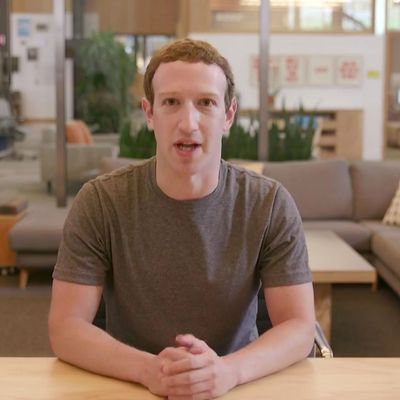
In his first day back from paternity leave, Facebook CEO Mark Zuckerberg jumped right back in with an appearance on Facebook Live. Only, instead of a fun chat with users, he used the product to address the intense scrutiny Facebook has come under from both the government and users concerning foreign meddling during the 2016 election, after Facebook disclosed earlier this month that it had found thousands of ad purchases made by Russia-linked accounts.
In his broadcast — accompanied by a status-update transcript, natch — Zuck said the company was disclosing data about the purchased ads to Congress, and that the company was slow to release data to the public because of privacy concerns. (It had already given data to federal prosecutors, possibly due to a subpoena.) “Disclosing content is not something we do lightly under any circumstances. We are deeply committed to safeguarding user content, regardless of the user’s nationality, and ads are user content. Federal law also places strict limitations on the disclosure of account information,” Facebook general counsel Colin Stretch wrote in an announcement accompanying the video. He also unveiled a nine-point plan for what the social network will do going forward.
That includes cooperating with current investigations and strengthening the ad-review process going forward. The most important announcement, and a rare one for Facebook, regarded stronger transparency in political ads.
Going forward — and perhaps the most important step we’re taking — we’re going to make political advertising more transparent. When someone buys political ads on TV or other media, they’re required by law to disclose who paid for them. But you still don’t know if you’re seeing the same messages as everyone else. So we’re going to bring Facebook to an even higher standard of transparency. Not only will you have to disclose which page paid for an ad, but we will also make it so you can visit an advertiser’s page and see the ads they’re currently running to any audience on Facebook. We will roll this out over the coming months, and we will work with others to create a new standard for transparency in online political ads.
This is a great step. Knowing who’s behind the things you’re seeing on Facebook, and what they’re telling other people, is a good way to rupture the filter bubbles that were exploited by malicious (and greedy) actors last year. The dark age of online political advertising, aggressively concentrated around Facebook, appears to be at an end.
Other parts of Zuckerberg’s announcement focused on collaboration with cybersecurity companies and other large tech platforms (representatives from Twitter will testify before Congress next week). In the meantime, Facebook is committed to making sure its users don’t get psyoped by the Kremlin.





























